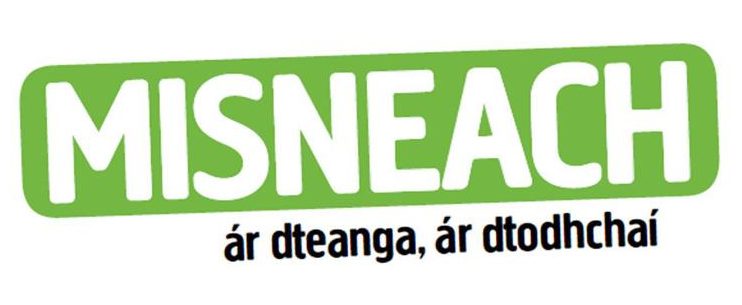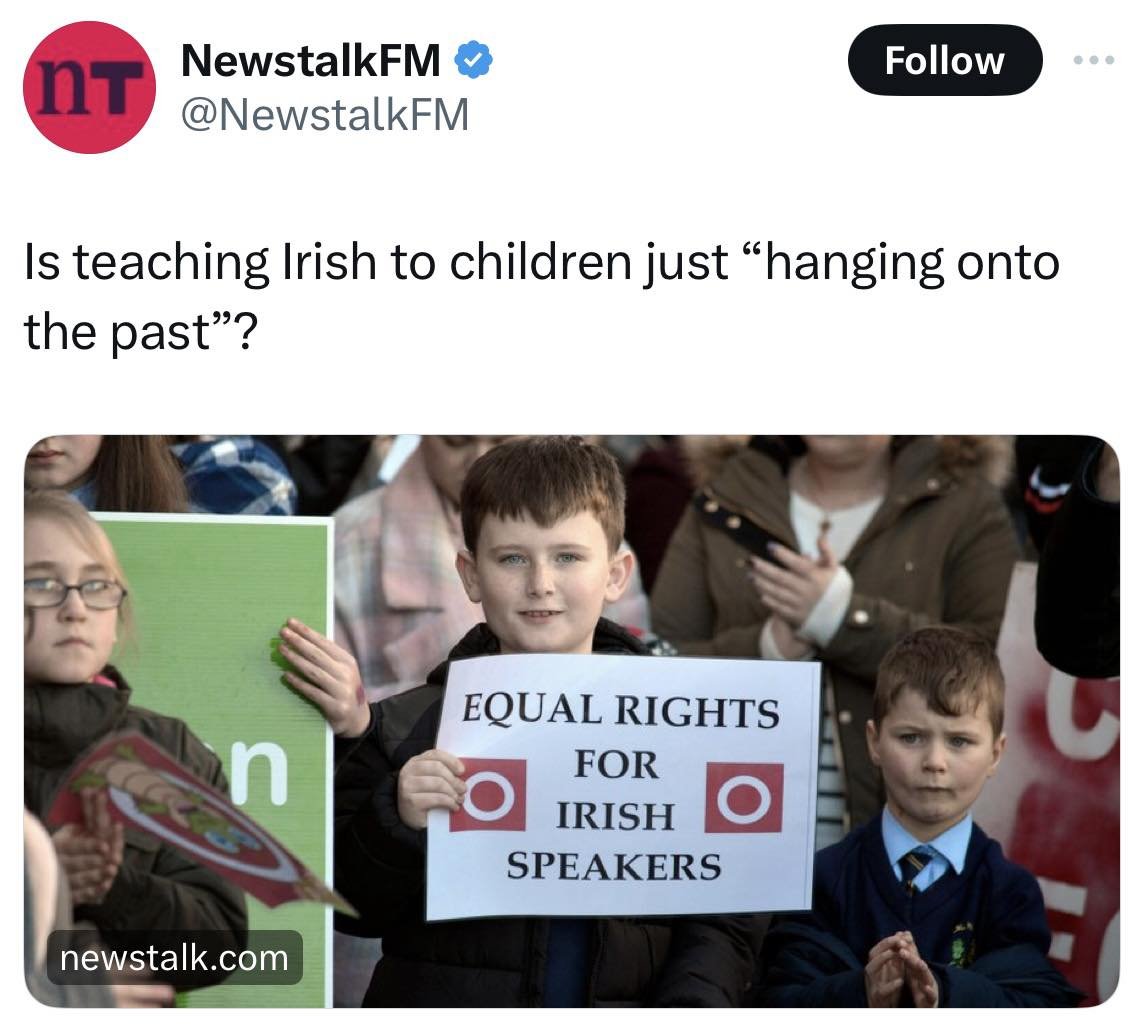Colonial Discourse On The Irish Language Still Rife In The Twenty-Six Counties
Every so often ‘journalists’ in the Twenty-Six Counties deign to allow discourse on the Irish language in the English-language media. The release of census results every five years usually stirs up some discussion on the state of the language in modern Ireland, before the question is then forgotten about for another few years.
More often than not, the purpose of discussing the Irish language is motivated, not by a need to find ways in which to promote our native tongue, but instead, and as with many other topics aired by the media, the purpose is to stir controversy.
This motivation, arising from a colonial loathing of the Irish language, is done consciously and with purpose. We do not need to stray too far into the past to see examples of this, we only have to look to last week with the repeated attacks by Newstalk presenters against the language and the incoherent ramblings of journalist Brenda Power on RTÉ’s Upfront programme.
On the show, Power claimed that the Irish language was ‘dead’, despite the clear evidence of its continued survival both as a community language and in various spheres of Irish society, from the education system straight through to the media.
On other occasions this process of denigration operates at a subconscious level and is couched in terms of ‘humour’. The bizarre ‘bit’ on last Saturday’s Late Late Show in which US presenter Conan O’Brien was coaxed into mocking the Irish-language names of people in the audience was an illustration of this self-loathing colonial cringe. Evidently, the Anglocentric mind finds great amusement in different languages having different phonetic systems.

In the Six Counties, this colonial opposition manifests in unionist hostility to every aspect of the Irish language, with the current point of focus of this being fervent unionist opposition to the erection of bilingual signage in Belfast and in other urban centres.
Although there is a spectrum of usage, the Irish language essentially operates on two interlinked levels in Ireland – within the education system and outside the education system.
Many sociolinguists maintain that languages which are robust will see high levels of intergenerational transmission and community usage. This mainly occurs in the Gaeltachtaí, although these areas are under serious threat due to their historic marginalisation, lack of infrastructure, and lack of democracy in how they are run.
Despite the overall importance of the Gaeltachtaí as a fount of the language for speakers elsewhere, both linguistically and in terms of Gaeltacht natives involved in Irish-language media and education, little time is given in the English-language media to discussing the maintenance of these areas.
The impact of the housing crisis, the blight of holiday homes, the lack of broadband, poor infrastructure such as roads and quays, an over-reliance on the fickle tourist industry to sustain the economy, and the progress of the language planning process are all issues that should be up for discussion when talking about the future of the Gaeltachtaí.
However, one topic that the English-language media does regularly discuss is the matter of ‘compulsory Irish’ within the education system. Undue focus on this aspect of the discussion around the Irish language pleases the old guard anti-Gaeilge types resentful at having been ’forced’ to read Peig in the 1970s.
Such discussions rarely deal in facts and almost always bring myths around the language to the fore. One contributor on RTÉ’s Upfront programme that discussed ‘compulsory Irish’ bizarrely stated that he was a huge fan of history, yet appeared almost enthusiastic to see the death of the Irish language.
Gladly, as illustrated by numerous surveys over the years, such viewpoints are in the minority and most people are in favour of continued state support for the Irish language in the education system.Play
The Department of Education is to blame for much of the ire that is directed at the teaching of Irish within the education system in the Twenty-Six Counties.
Since the Twenty-Six County economy began to shift towards a more globalised system in the 1960s, the Department has consistently eroded the status of the Irish language within English-medium schools.
The updated curriculum recently published by the Department removed a further half an hour of Irish instruction from the time allocated to subjects for English-medium schools. There is much talk of reforming ‘teaching methods’ for Irish, but the amount of time required to acquire the language is key, and this has been constantly eroded over the last number of decades by the Department.
One commentator recently noted that the Department is seeking to “kill the Irish language by stealth” within the education system. The lax derogations system recently introduced for students who do not wish to take Irish at Leaving Certificate level confirms this.
Tens of thousands of students are now opting out of learning Irish on spurious grounds, despite the Department of Education being warned that this would happen.
Moreover, the Department and others who support this derogations system and who argue against Irish being a core subject, use spurious arguments citing ‘multiculturalism’ and ‘inclusivity’ to state that foreign born students be allowed to opt out of learning Irish. This is in fact a racist policy, the real essence of which is the belief that people who arrive from overseas are not be capable of learning Irish, or have no interest in integrating into Irish society through acquiring Irish.
The same Department has also consistently stood in the way of the founding of gaelscoileanna. Between 25% to 50% of parents in the Twenty-Six Counties would send their children to a gaelscoil or gaelcholáiste if given the opportunity, yet 102 years after the founding of the state only 8% have this opportunity.
Removing Irish as a core subject in the wider-education system will only erode the Irish language further, it will not “allow those who are serious about it, to study it” as some may claim. It will only remove the option for the many who want to study.
‘Compulsory Irish’ provides a decent foundation on which to expand the teaching of Irish.
More resources need to be put into the teaching of Irish in English-medium schools, with the progressive phasing in of the teaching of some subjects through Irish. In combination with this, a critical mass of gaelscoileanna should be built up to provide a real foothold of competency in the language for hundreds of thousands of people across the state.
More immediately, and away from the focus on ‘compulsory Irish’, those Gaeltachtaí which are under severe pressure need to receive increased investment from the state in the form of Universal Public Housing and the provision of local services, two measures which will sustain the next generation of Irish speakers who use the language as a communal one.
The re-establishment of Irish as an everyday living language can only work if it is led by a community driven movement, adequately resourced by state funding that is ring-fenced and secure.


